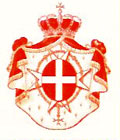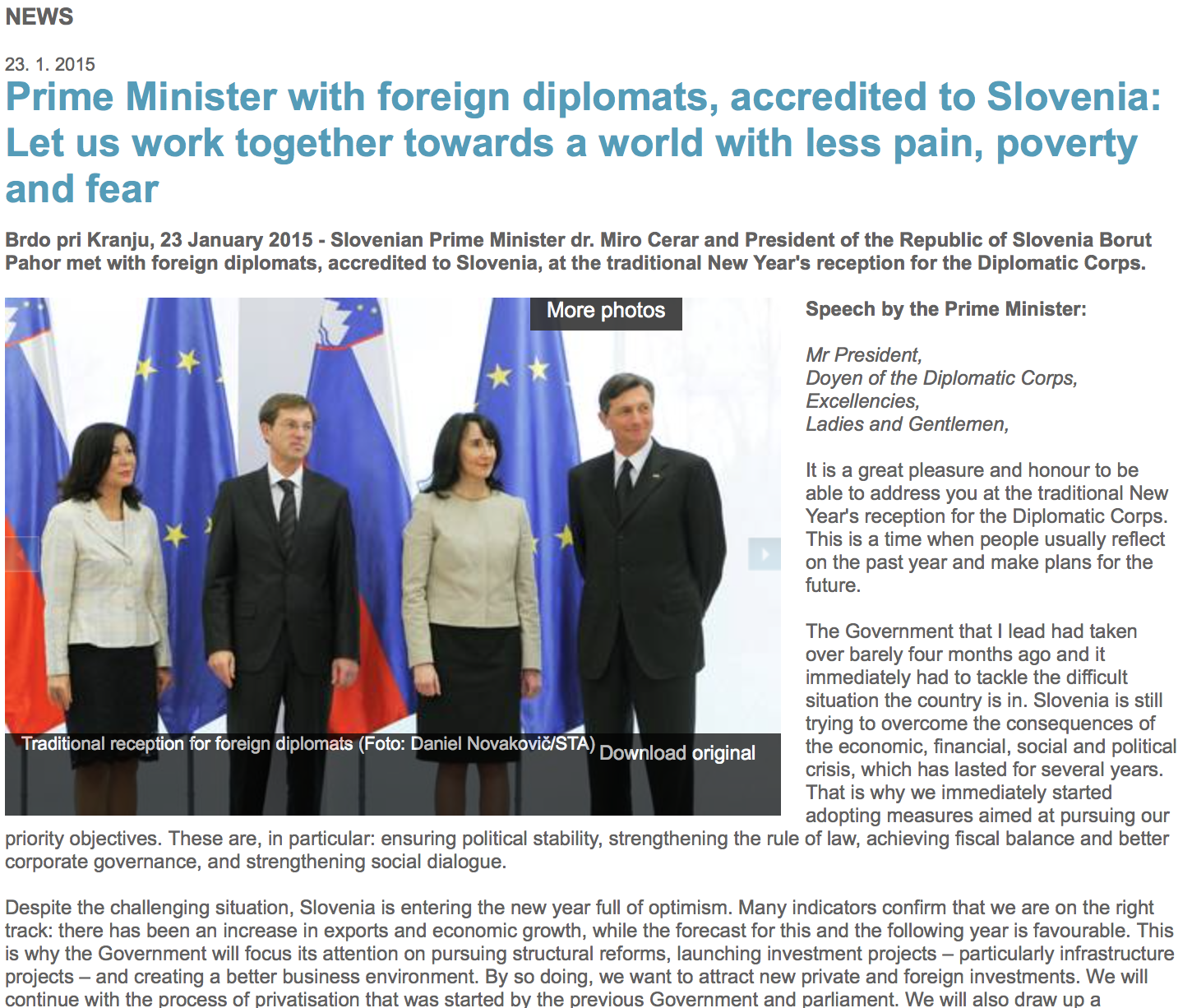
| Address of The President of the Republic of Slovenia Borut Pahor and The Prime Minister Miro Cerar to the Diplomatic Corps at Brdo 2015 |  |
H.H. The Ambassador Prince Windisch-Graetz with H.E. The President and H.E. The Prime Minister
Ljubljana, 27. 1. 2014 | press release, speech
Address by His Excellency the President of the Republic of Slovenia
Your Excellency,
Dean of the Diplomatic Corps,
Excellencies,
please accept once again my best wishes for the year that has already begun. We wish peace, freedom and progress to all the nations and countries that you represent. On behalf of my country, I emphasise a strong and sincere commitment to the continued strengthening of our friendship and cooperation in this context.
Excellencies,
in terms of overcoming the crisis, this year may be both a turning point and a demanding year for Slovenia. Personally, I believe that these two are related. If at the end of this year, Slovenia is to finally pull out of the crisis, a number of practical measures and structural changes will be required in the process. In political terms, this is a difficult and thankless task. Moreover, in my opinion, this is possible only through considerable cooperation and agreement between all political forces in the country. Let me emphasise that, in view of this, I am ready to offer my best support and assistance.
The task is made even more difficult because there are no immediate political rewards for taking bold, ambitious and necessary decisions. However, it is also easier, in so far as we have learned in the last five rough years that opportunism and tactical manoeuvres are not rewarded in the long run. Politicians must take into account that people’s patience is limited, which is precisely why they must join forces and take decisive action.
While it is understandable that, in many respects, people’s confidence and faith in a better future has been undermined, it would be reckless to ignore the fact that the vast majority are willing to understand and accept difficult decisions if politicians can present them in a comprehensible and unified way. It is encouraging that we are starting to believe in good news and good stories as well. It is even more important that we are becoming increasingly confident that we can manage after all.
Therefore, it is of crucial importance that in the current year the winning mentality prevails over feelings of helplessness and discouragement. It is quite possible that at this event next year, we might be looking back proudly at the work we have done. I am well aware that success largely depends on us alone.
Excellencies,
it is very important for Slovenia not to be too quickly satisfied with too little success this or next year. We are aware that we need to considerably strengthen the institutions of the rule of law, and in particular, our competitiveness, in order to achieve a long-term recovery and increased sustainable growth and social stability. This is not merely a question of statistical data showing that Slovenia has slipped another eight places down the competitiveness rankings; instead, we are becoming increasingly aware that we can survive in the global economy of the 21st century only if we are able to develop and put all of our competitive advantages to use. I repeat, this is a very difficult task that we political leaders have set ourselves and the people we serve. In fact, in order to succeed, it will be necessary to sweep aside the last traces of political popularity and understand that the only reward will be personal satisfaction.
Slovenia is aware that there are no other good choices available. Moreover, Slovenia, like many other European partner countries, has to prepare even today for the next crisis that will sooner or later break out in the global market. It would be irresponsible to turn a blind eye to this fact. The crisis that exploded in 2008 could already have been anticipated at the outbreak of the financial turmoil on Wall Street in 2001.
In a way, the problem with both crises is that their roots have not been eliminated. The global financial industry remains unregulated, and the heritage of this crisis is an even wider gap between rich and poor. The European Union might even be the organisation that has done most to remedy the situation by establishing the banking union and introducing certain other measures. Slovenia is expressing its satisfaction, as well as the desire for a more ambitious plan from the international community.
The question of whether the international community is able to take the appropriate action to address both phenomena is more relevant than ever. It is ultimately a question of preserving world peace.
Excellencies,
to be aware of our own responsibility for overcoming the crisis is not, of course, to underestimate European and international circumstances. However, the assessment of the situation one year ago and today shows a shift for the better. The economies of the euro area and the European Union show noticeable signs of recovery, which is of special and positive significance for the export-oriented Slovenian economy.
Our domestic and European economies are seriously confronted with the issue of their competitiveness in the global economy. The challenge is almost identical. We need to find a new and dynamic balance between competitiveness and social cohesion in the process of economic recovery if this recovery is to be long term.
This is a challenge of strategic importance also in the light of the future of the European Union. We will monitor the decision of Europeans at the European elections in May this year with great interest. It will at least give us some understanding as to whether, and to what extent, the European Union is regarded as a broader homeland that provides us with peace and prosperity - and to what extent it is not.
In view of my many appearances at home and around the world where I have expressed my view on the future of the European Union, I believe that there is no need to repeat it at today's reception. However, let me emphasise that I will not only monitor the decision of Europeans in this year's elections with interest, but will also make every effort, understandably within the context of limited powers, to ensure the success of policies that favour the continuation and strengthening of the European Union. Stagnation or even the decline of this great idea would push the Slovenian nation and our barely established independent state into harsher and much more unpredictable circumstances.
The European idea is the fertile soil of our progress. However, it is not to be taken for granted and should be pursued outspokenly through a determined effort. In Europe, some important political forces talk without embarrassment about the disintegration of the European Union as their political objective. Those of us who think differently cannot and must not remain silent. As far as I can assess the mood of Slovenian people, their experience of the European future is encouraging and supportive on this point.
Excellencies,
last year on this occasion I assured you, with the necessary caution, that we would reach a consensus on the ratification of Croatia's accession treaty to the EU. And so we did. We honoured our commitments, and we expect that our Croatian friends will honour theirs. When I talked about the need for reconciliation, peace and prosperity and the European perspective of the Western Balkans, I predicted, again with the necessary caution, the revival of the Brdo Process. In the middle of last year, the leaders of this informal initiative met and gave it new impetus. The presence and messages of the French President were very important for the future of this part of Europe.
I anticipate the forthcoming continuation of this process, perhaps again with an important guest from the European Union. In this context, I take this opportunity to welcome the efforts of Serbia and Kosovo to peacefully resolve bilateral issues. We are pleased with Serbia’s progress in its efforts to join the EU. We will also make this same effort, as far as possible, for Bosnia and Herzegovina, Macedonia, and last but not least, Kosovo. I will endeavour to ensure that, there too, Slovenia is a responsible partner for peace and prosperity in the European Union and the international community.
Excellencies,
this year, the development of a new strategy in Slovenian foreign policy can be expected. The new feature of this strategy will not mean a change in the permanent orientation of the Slovenian foreign policy, which will remain the same, but rather a focus on the priority tasks of the next decade and on successfully adapting the needs and potential of the Slovenian diplomatic network.
In any event, the main orientation of our European and foreign policy activities remain the maintenance or strengthening of friendly ties with other nations and states. In particular, we will pursue this end in our relations with those with whom we are linked in political or military alliances, and those with whom we have entered or seek to enter into agreements on strategic partnerships. Excellent political relations must be upgraded with a high level of economic cooperation, without, however, neglecting our responsibilities and the opportunities offered by culture and its power to connect people.
Excellencies,
please extend, once again, my best wishes at the beginning of this year to the heads of your states, with a sincere hope for the further enhancement of our mutual trust and cooperation for the benefit of the people we represent.

The Apostolic Nuncio to the Republic of Slovenia H.E. Archbishop Juliusz Janusz
